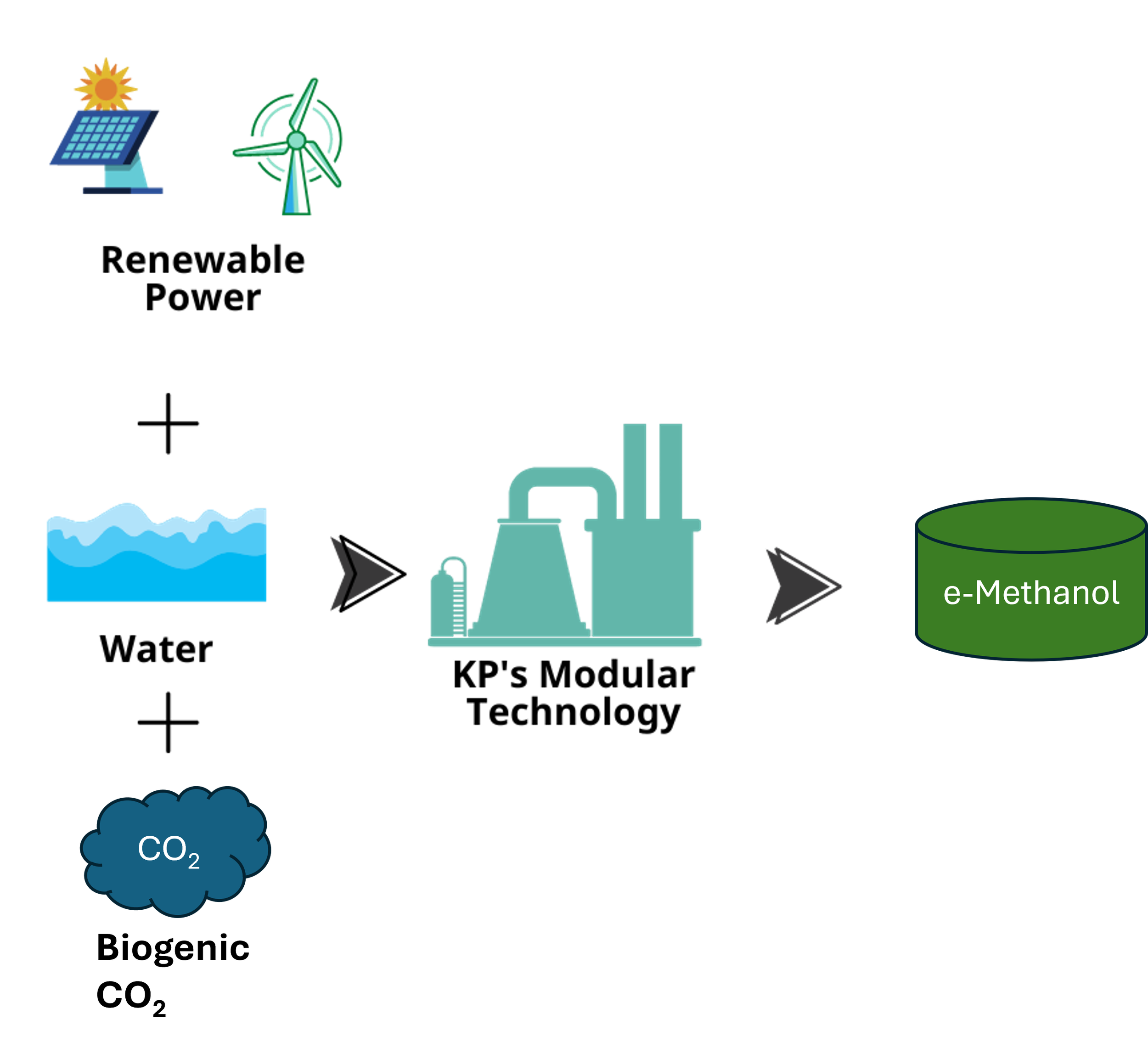Protecting Nature, Powering the Future with eFuels Today.
Enabling clean fuels for a livable planet.
“We do not inherit the Earth from our ancestors; we borrow it from our children.”
Konscious Planet develops and delivers next-generation eFuel projects that transform renewable power and captured CO₂ into clean, scalable molecules like e-methanol.
We deploy modular, distributed fuel infrastructure—bringing carbon-neutral energy to ports, industry, and off-grid communities while enabling the green molecule economy.
Our Core Offering: e-Methanol
As the global demand for clean energy intensifies, e-methanol has emerged as a leading solution for decarbonizing transportation, industry, and energy sectors. Konscious Planet (KP) leverages proprietary, modular technology to produce e-methanol efficiently and cost-effectively.
Our process combines biogenic CO₂ — captured from sources like anaerobic digesters and ethanol plants — with green hydrogen produced using renewable electricity and water through electrolysis. This integrated approach results in a carbon-neutral fuel that can replace fossil fuels across multiple industries.
KP’s scalable plant design, dynamic operation capabilities, and distributed production model minimize logistics costs and enable flexible deployment wherever renewable energy and CO₂ are available.
With over 60 years of combined experience in clean energy, fuels technology, and project development, the KP team brings deep technical expertise and proven leadership to drive the e-methanol transition forward.
KP technologies will enable
Distributed Production of Clean eFuel
eMethanol as a Versatile Product
eFuels for Internal Combustion Engines.
Renewable Power-to-Fuel Storage
Enabling the Green Molecule Economy
WHY WE STAND OUT
-

Modular
Flexible, Scalable eFuels Production
KonsciousPlanet’s modular eFuels technology enables localized production of clean fuels like methanol and ammonia, offering a lower-cost and lower-risk alternative to large centralized refineries—ideal for port, industrial, and off-grid settings.
-

Economic
Distributed Fuel, Closer to Demand
Our systems are designed for small- to mid-scale production, situated near the point of use. This minimizes transport costs and infrastructure needs—improving fuel access while enhancing project economics and energy resilience.
-

Renewable
Powering eFuels with Water, CO₂, and Clean Electricity
KonsciousPlanet’s system uses renewable electricity to split water and generate green hydrogen. CO₂ is sourced from biogenic, industrial, or DAC systems—enabling the production of carbon-neutral fuels like methanol and SAF.
-

Proprietary
Optimized Synthesis with Lower Energy Footprint
Our proprietary synthesis units convert green hydrogen and captured carbon or nitrogen into drop-in eFuels using advanced reactor designs optimized for efficiency. These units operate at reduced utility loads, ensuring lower OPEX and a smaller carbon footprint.
Why Now?
Human civilization is waking up to the enormous cost of fossil fuels. This has led to the wide-scale adoption of renewable electricity generation by harnessing solar, wind, and hydroelectric power across the world. The world is producing excess renewable power which sometimes has to be dumped as there is no way to store the excess electricity. It is only in recent years, that the cost of renewable power is lower than traditional fossil fuel-based power (source: IRENA Renewable Cost Database).
KP’s technology will enable the conversion of economical renewable power to ammonia.
Versatility in Technology
KP’s system has simple operation despite the advanced design with plant life of 25 years
Designed to handle the fluctuations in renewable electricity supply – commonly expected for renewables
The catalyst life is greater than 15 years for maximum operational efficiency
An innovative reactor design and control scheme enables real-time adjustment of methanol output in response to fluctuations in renewable electricity supply.

“Low-emission eFuels can diversify decarbonization options in transport, particularly aviation and shipping. Their production is energy-intensive but critical where direct electrification is not viable.”
—IEA, The Role of E-fuels in Decarbonising Transport (2023)
“The production of e-fuels based on green hydrogen is essential to reach net-zero emissions in sectors where direct use of electricity is impossible.”
— IRENA, World Energy Transitions Outlook (2022)
“E-fuels like hydrogen, ammonia, e-methanol, or e-SAF can be produced from renewable energy and feedstocks and are more economical to deploy in aviation and maritime shipping than direct electrification.”
—OECD/ITF, The Potential of E-fuels to Decarbonise Ships and Aircraft (2021)
Join our mission. Become an Investor.
Sign up to be the first to know about our events.






